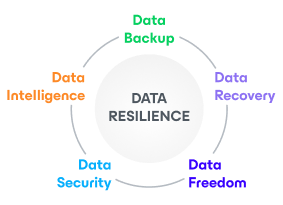In a world of relentless digital transformation, finding a technology solution that provides flexibility, cost-effectiveness, and security has become paramount. This is particularly true for small and mid-sized businesses (SMBs), where resources are often limited but the need for agility is high. That’s where the hybrid-cloud model offers a compelling solution.
Benefits of a Hybrid Cloud
Hybrid-cloud environments combine the strengths of public cloud services (like AWS, Azure, or Google Cloud Platform) with the control and customization of on-premises private clouds or dedicated servers. This powerful combination allows SMBs to tailor their cloud presence to match their unique business needs. Let’s explore why small and medium business are increasingly turning to hybrid-cloud solutions and how they can power growth and innovation:
- Cost optimization
Hybrid cloud gives you the best of both worlds in terms of cost. Sensitive workloads or data requiring heightened security can reside in your private cloud with predictable costs. Meanwhile, applications needing on-demand scalability, like a customer-facing website, can be placed in the public cloud, allowing you to scale resources up or down seamlessly, only paying for what you use. This mix-and-match approach allows small and mediums organizations to get the most out of every IT dollar.
- Unmatched flexibility and agility
The very definition of hybrid cloud is adaptability. SMBs need to react quickly to changes in the market or surges in demand. With hybrid cloud, you aren’t locked into a rigid infrastructure. Seasonal workloads, temporary testing environments, or even unexpected spikes in traffic can be easily handled by “bursting” them into the public cloud. This ensures business continuity without the need to invest in on-premises hardware that may sit idle for a good part of the year.
- Enhanced data protection and disaster recovery
Data remains the lifeblood of any organization. A hybrid-cloud strategy can significantly improve your data protection and disaster recovery (DR) posture. Important data can be backed up and replicated to both private and public cloud locations, providing the essential redundancy to ensure data is recoverable even in the worst scenarios. Hybrid cloud provides the peace of mind that your critical information is safe, reducing the risk of downtime and costly disruptions.
- Robust security with granular controls
Security concerns often lead small and mid-sized organizations to maintain an on-premises infrastructure. However, a hybrid strategy doesn’t compromise security. Your private cloud lets you manage the most sensitive data, applications, and regulatory compliance requirements in-house, with full control over security measures. This can be combined with the advanced security capabilities of leading public cloud providers, providing layered protection and minimizing potential attack vectors.
- Bridge to full cloud migration
Many SMBs desire the ultimate flexibility of a full public cloud setup, but the transition can seem daunting. Hybrid cloud serves as a bridge. It allows you to gradually migrate workloads, experiment with cloud-native services, and train your staff without impacting business operations. This incremental approach reduces the risk of disruption and gives you time to develop cloud-focused skills and expertise.
Considerations for a Successful Hybrid-Cloud Journey
To unlock the full benefits of hybrid cloud, small and medium businesses should pay attention to these key factors:
- Connectivity: Seamless data flow between your private and public cloud setups is key. Ensure your on-premises infrastructure has reliable bandwidth and the integration tools necessary for smooth communication between the two environments.
- Management: Hybrid architectures require management and monitoring for both your private cloud and your public cloud resources. Consider using specialized tools or working with a managed service provider (MSP) to help streamline these operations and maintain visibility over your entire hybrid ecosystem.
- Data portability: Ensure data can move in and out of the public cloud easily. Look for solutions that prevent vendor lock-in and enable effortless data migration if needed.
Veeam: Your Hybrid Cloud Partner
At Veeam, we understand the unique challenges faced by small and mid-sized businesses. Our data protection and availability solutions are designed to work effortlessly in hybrid-cloud environments.
- Cloud-native backups: Protect your data regardless of where it lives with direct backups to popular public cloud object storage like AWS S3, Azure Blob, and Google Cloud Storage.
- Flexible workload mobility: Easily move workloads between your on-premises environment and the cloud for testing, DR, or complete migration.
- Ransomware resilience: Strengthen your final line of defense against ransomware with immutable and air-gapped backups across your hybrid infrastructure.
Conclusion
Hybrid cloud isn’t just for large enterprises. It’s a powerful tool for small and mid-sized businesses looking for the perfect blend of flexibility, cost optimization, and security. By embracing this adaptable model, SMBs can streamline operations, unlock new levels of agility, and gain a critical competitive edge.
Let Veeam guide you on your hybrid-cloud journey and ensure your data is always available, protected, and ready for anything!
